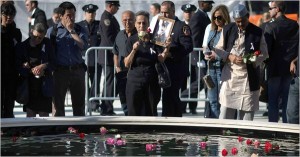9/11 Memoirs
 The ninth anniversary of Sept. 11 passed in New York this weekend with a focus on the two fracases of the day: the “Ground Zero mosque” and the would-be Koran burners and their emulators.
The ninth anniversary of Sept. 11 passed in New York this weekend with a focus on the two fracases of the day: the “Ground Zero mosque” and the would-be Koran burners and their emulators.
For the decade between the fall of the Berlin Wall and the fall of the Twin Towers, many Americans turned away from the rest of the world, a regretful sort of superpower powernap. Talking about Sept. 11 is shorthand for talking about how America should exercise its power in the wider world, how to measure blowback, how to balance soft and hard power, how to curb extremism at its roots while also pruning its branches.
Anne and Manny Fernandez wrote a piece yesterday that catalogues what 9/11 looks like today, rather than trying in overwrought prose to figure out what it means. They focus on “an unmistakable sense that a once-unifying day was now replete with division” – although one could argue that from the first decisions that followed the Sept. 11 attacks American political life grew more divided than ever.
In a similar vein, I reviewed Scott Malcomson’s memoir in the Times’ Sunday Book Review section. Reading his recollection of 9/11 and the years that followed forced me for the first time in ages to recall their intensity and the sense of a bottom falling out.
The morning of Sept. 11, 2001, found me on my stoop in Boston’s South End, waiting for a ride to work. One minute I was enjoying the sunshine, worrying about the logistics of moving house. Then the first plane struck the north tower of the World Trade Center and my entire frame of reference lurched. What I don’t quite remember is how that painful, personal moment connected to America’s national experience in the aftermath of the attacks — and to what many saw as the erosion of civil liberties, unnecessary wars and the willingness to scorn allies and international institutions.
It is this link that concerns Scott L. Malcomson in “Generation’s End: A Personal Memoir of American Power After 9/11.” How, Malcomson inquires, did the world’s sole superpower surrender its better judgment and squander so much good will? Read the rest.
Normalcy, perhaps, is a feeling that only prevails in historical retrospect.
The Decisive Ones
At Length Magazine has just published a short memoir I wrote of the early days of the Iraq invasion. You can find it under prose on the homepage, or you can click here to link directly to the piece. Here’s how it opens:
“Fuck you fuck you fuck you. Fucking American army piece of shit,” Sa’ad al-Azawi chanted behind the wheel of his BMW. He couldn’t recognize his own city, he couldn’t navigate it. He just wanted to hop across the July 14 Bridge to the manicured center of the city’s power, Baghdad’s palm-lined answer to the Washington Mall, soon to be home to the occupation headquarters. A tank blocked an on-ramp. We had to circle west along the Tigris River and then back east again to get to the Rashid Hotel.
Baghdad’s map had become malleable, old routes across town melting away like mercury and reforming in odd places. Americans had closed some roads and bridges with checkpoints. They had cut others with bombs. Buildings were missing in action. Pits of rubble had replaced homes, like an entire block that included a Saddam safe house behind a Mansour restaurant. A bunker buster had buried a three-story house in a pit 20 feet deep.
Along the approach to Baghdad, every hundred yards or less, a killed car askew beside the road — either a rotting driver, shot to death, or a charred car frame from a direct hit on the car by some kind of bomb. (Rocket? RPG? Mortar? So early in the war, I certainly couldn’t tell.) Bullet casings at every intersection, detours around each part of the highway bombed into a moonscape. A bloated dead donkey blocked the bridge across the Tigris in downtown Baghdad. You could date the bodies in the cars and sometimes on the sidewalks by their shape and smell. Within days of death the skin turned black. As they decomposed they bloated to twice their normal size. And they smelled stronger than anything I’ve smelled before, like that rush up the back of your nose from your stomach just before you vomit, and then blooming into something worse.

